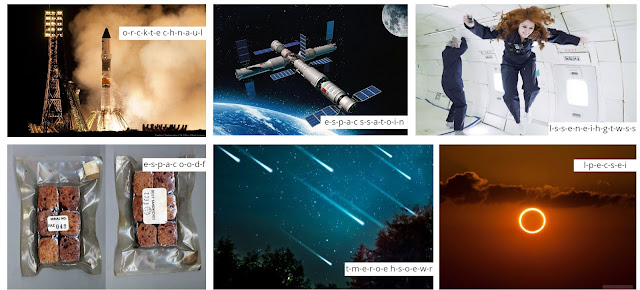The First in Space
- What is the difference between an astrologer and astronomer?
- How many planets are there in the solar system?
- What was Yuri Gagarin’s job?
- Who was the first man on the Moon?
- By how much is the Moon’s gravity smaller than that of the Earth?
- What do you call a body that moves around a planet, like the Moon?
- What do you call a small piece of a comet that sometimes hits the Earth?
- Can you name the planets that you see?
| A | B |
|---|---|
|
|
We can’t see the Moon during the … because the Earth’s shade hides it.
We can’t see the Sun during the … because the Moon hides it.
June is a winter month in the …
December is a winter month in the …
Polar bears only live at the …
The longest day of the year is also called …
And the shortest day of the year is called …
There is a Greek myth about a goddess spraying milk across the sky. That’s why we call our galaxy the ...
Why are there seasons on Earth?
Which is true?
Solstices / equinoxes designate the point when the Sun’s path in the sky is the farthest north or south from the equator.
Solstice / equinox is the time when the sun is right over the equator.
What astrological event do the following dates correspond to:
June 21-22?
On September 23?
On December 21-22?
On March 21?
What does the word ‘equinox’ mean?
⭐Star idioms.
What would you choose:
Be ambitious and set your goals very high and reach / look / search for the stars!
It was seen / written / shown in the stars that they would meet and fall in love.
Jack is a raising / rising / escalating star: look out for him on TV.
I could see / watch / split stars when I hit my head on the cupboard.
Jill is born under a happy / kind / lucky star, she is very fortunate.
She was too starry- eyed / headed / minded about her future.
I was a star- hit / struck / crashed cinemagoer. I was very impressed by famous actors.
All of the pieces just fell into place for the project to get underway. It's like the stars circled / jumped / aligned or something.
You can always count on Dad to hang up the old Stars and Lines / Stripes / Bars for the Fourth of July.
With her star turn / twist / bend in that film, I think we'll be hearing about this actress for years to come.
Answer key
- Hasn’t she failed her role in the film?
- Isn’t he the least lucky person in the world?
- Aren’t they indifferent to the fame of this actor?
- Isn’t she still unknown in show business?
- Wasn’t their encounter a matter of chance?
- Didn’t he unfurl the Union Jack?
- Aren’t they pessimistic about their future?
- Didn’t you just walk past that wall?
- Aren’t we doomed to wait for better times?


.jpg)
Comments
Post a Comment